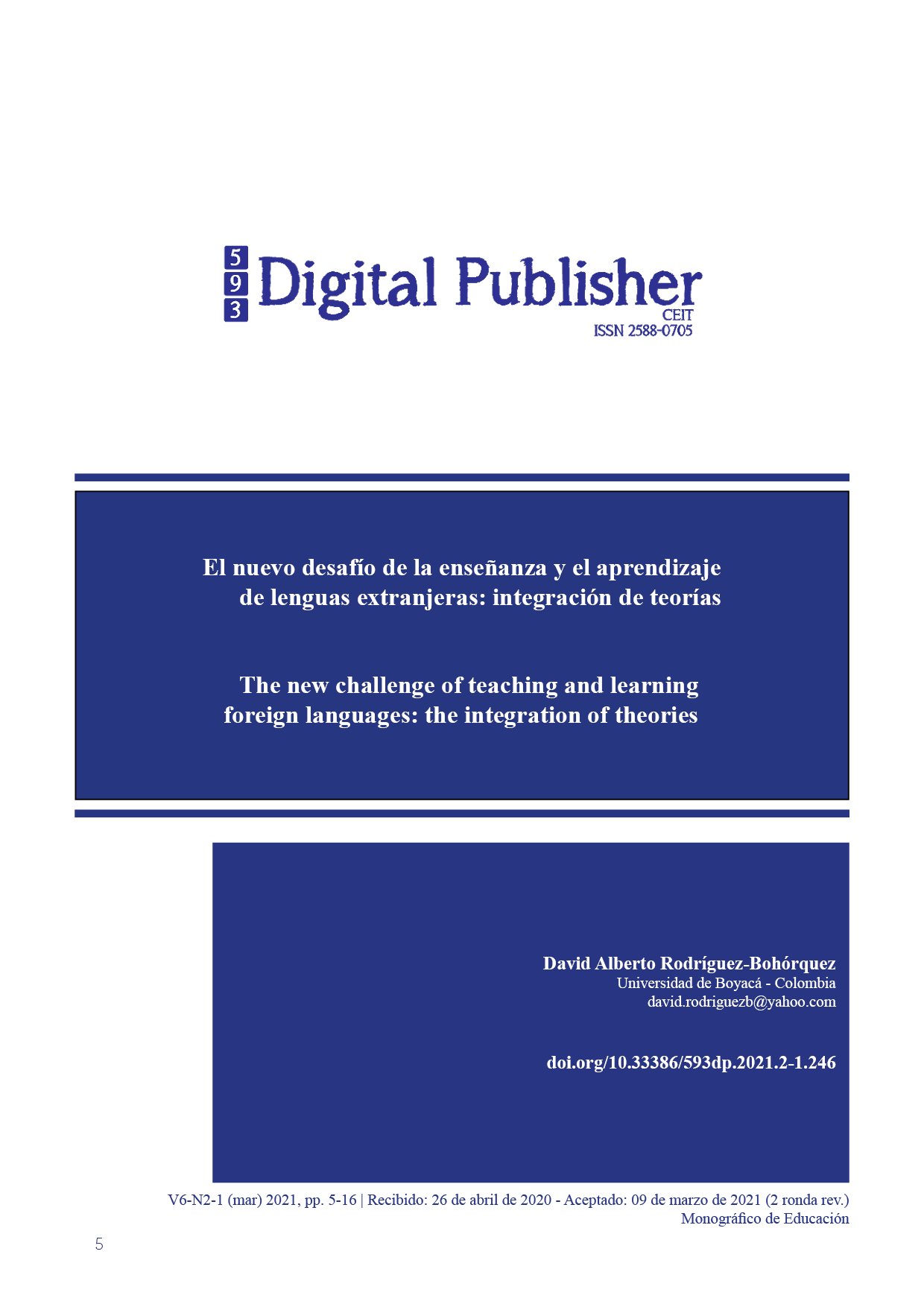The new challenge of teaching and learning foreign languages: the integration of theories
Main Article Content
Abstract
This article establishes a relationship between two important authors, Lev Vigotsky and Stephen Krashen, whose theories contributed to the development of processes associated with foreign language training. In addition, this relationship is complemented by the structured stances in education in complex thought proposed by Edgar Morin. This review illustrates that the three approaches of these authors share characteristics which aim to build a learning experience immersed in context, whether linguistic, social or cultural. The three language learning paradigms stress the importance of creating learning environments where the foreign language can be used and shared in a social environment, so that better processes of foreign language acquisition may be generated, wherein both teachers and students are actors. Following on from the comparison of sources and a comparative education analysis, the conclusion of this article indicates the need to promote the social context of the real use of the language, to take into account the dynamism of the processes of thought and language and how these change at the same time as the individual develops and, finally, the inclusion of the affective component, both in the teaching practice and in the task of the student.
Downloads
Article Details

This work is licensed under a Creative Commons Attribution-NonCommercial-ShareAlike 4.0 International License.
1. Derechos de autor
Las obras que se publican en 593 Digital Publisher CEIT están sujetas a los siguientes términos:
1.1. 593 Digital Publisher CEIT, conserva los derechos patrimoniales (copyright) de las obras publicadas, favorece y permite la reutilización de las mismas bajo la licencia Licencia Creative Commons 4.0 de Reconocimiento-NoComercial-CompartirIgual 4.0, por lo cual se pueden copiar, usar, difundir, transmitir y exponer públicamente, siempre que:
1.1.a. Se cite la autoría y fuente original de su publicación (revista, editorial, URL).
1.1.b. No se usen para fines comerciales u onerosos.
1.1.c. Se mencione la existencia y especificaciones de esta licencia de uso.
References
Cerdas, G., & Ramírez, J. (2015). La en-señanza de lenguas extranjeras: historia, teoría y práctica. Revista Lenguas Modernas, (22). doi: 10.15517/rlm.v0i22.19687
De Jesús, M., Andrade, R., Martínez, R. y Méndez, R. (2007) Re-pensando la educación desde la complejidad. Polis, 16.
Espejo, R. (2010). Algunos aspectos de la educación compleja. Polis, 9(25), 119-135. https://doi.org/10.4067/S0718-65682010000100007
Flores, J. (2011). Complejidad y educa-ción. Revista Diálogos, 5(7), 23-34. Recuperado de http://www.redicces.org.sv/jspui/bitstream/10972/2048/1/2.%20Compleji-dad%20y%20educacion.pdf
Hernández, R. G. (2006). La zona de desarrollo próximo. comentarios en torno a su uso en los contex-tos escolares. Recuperado de https://ebookcentral.proquest.com
Jiménez, J. (2008). Aproximación al pensamiento complejo. Revista Legéin, (6), 11-22. Recuperado de http://revistalegein.univalle.edu.co/documentos/legein6/PensComplejo_n6.pdf
Krashen, S. D. (1982). Principles and practice in second language ac-quisition. Oxford: Pergamon Press.
Luengo-González, E. (2016). El cono-cimiento complejo: método-estrategia y principios. En LG. Rodríguez-Zoya (coord.). La emergencia de los enfoques de la complejidad en américa latina: desafíos, contribuciones y com-promisos para abordar los pro-blemas complejos del siglo xxi (pp.61- 82). Argentina: Comuni-dad Editora Latinoamericana. Recuperado de https://rei.iteso.mx/handle/11117/5407
Maldonado, C. E. (2014). ¿Qué es eso de pedagogía y educación en complejidad?. Intersticios socia-les, (7), 1-23. Recuperado de http://www.scielo.org.mx/scielo.php?script=sci_arttext&pid=s2007-49642014000100002&lng=es&tlng=es.
Morin, E. (1999). Los siete saberes ne-cesarios para la educación del fu-turo. Santillana. Recuperado de https://unesdoc.unesco.org/ark:/48223/pf0000117740_spa
Morin, E. (2001). El método: la naturale-za de la naturaleza. Madrid: Edi-ciones Cátedra.
Morín, E. (2002). El Método II. La Vida de la Vida. Madrid: Ediciones Cá-tedra.
Morin, E. (2006), El Método III. El cono-cimiento del conocimiento. Ma-drid: Ediciones Cátedra.
Morin, E. (2009). Introducción al pensa-miento complejo. Barcelona, Es-paña: Gedisa.
Martínez, R. M. Á. (2006). Análisis de dos conceptos clave en el estu-dio de las interacciones: Formato y zona de desarrollo próximo. Psicología y ciencia social, 5(2), 41-53. Recuperado de https://biblat.unam.mx/en/revista/psicologia-y-ciencia-social/articulo/analisis-de-dos-conceptos-clave-en-el-estudio-de-las-interacciones-formato-y-zona-de-desarrollo-proximo
Vasques, M. (2006). Reflexões sobre o modelo de aquisição de segun-das línguas de Stephen Krashen – Uma ponte entre a teoria e a prática em sala de aula. Trabal-hos Em Lingüística Aplicada, 45(1), 87-101. https://doi.org/10.1590/S0103-18132006000100006
Vygotski, L. (1979). El desarrollo de los procesos psicológicos superiores (3rd ed.). Barcelona: Crítica.
Vigotsky, L. (1995). Pensamiento y Len-guaje: Teoría del desarrollo cultu-ral de las funciones psíquicas. Recuperado de http://abacoenred.com/wp-con-tent/uploads/2015/10/Pensamiento-y-Lenguaje-Vigotsky-Lev.pdf

